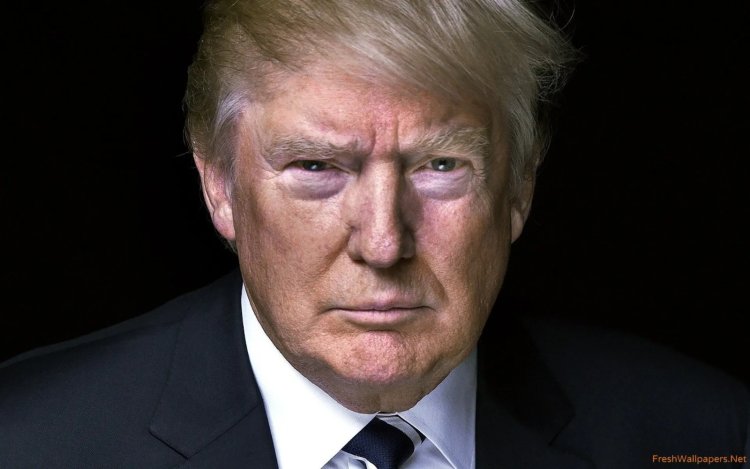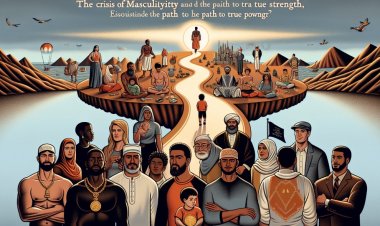The Rise of Donald Trump: A Journey to the Presidency
"Explore the unprecedented journey of Donald Trump from businessman to the President of the United States. This article delves into his political ascent, key moments in his campaign, and the factors that contributed to his rise in American politics."

Introduction
The rise of Donald Trump from a TV star to the President of the United States was a journey that captivated the nation. His campaign was filled with controversy, and he faced intense opposition from both political parties. However, understanding his journey to the presidency is incredibly important to comprehend the impact he has had on American politics and society.
Donald Trump's journey began with an escalator ride in 2015, when he announced his candidature for the presidency. Many dismissed him as a joke and believed he had no chance of winning. However, he defied all expectations and went on to secure the Republican nomination.
Throughout his campaign, Trump was known for his divisive rhetoric and unconventional tactics. He attacked his opponents and the media, and his inflammatory statements often made headlines. Despite the controversy, he connected with a significant portion of the American population who felt forgotten and ignored by the political establishment.
By understanding Trump's rise to power, we can gain insight into the factors that led to his victory and the impact his presidency has had on the United States and the world. Whether you support him or not, it is undeniable that his journey to the presidency has had a profound effect on American politics.
The Early Years
His success as a real estate magnate and a television personality defined Donald Trump's early career. He gained fame and fortune through his business ventures, most notably his real estate empire, which included properties such as Trump Tower and the Trump Taj Mahal casino. Trump's success in business made him a household name, and he became known for his flashy lifestyle and larger-than-life personality.
In 2015, Trump made a surprising announcement that he would be running for president. Many dismissed his campaign as a publicity stunt, believing that he had no chance of winning the nomination. However, Trump defied all expectations and went on to secure the Republican nomination.
One of the most memorable moments of Trump's presidential campaign was his escalator ride when he announced his candidature. This simple act symbolised his journey from television star to political figure and changed the course of American history. From that moment on, Trump became a serious contender for the presidency, and his campaign gained momentum.
Throughout his early years in politics, Trump faced intense opposition and controversy. His divisive rhetoric and unconventional tactics made headlines and earned him both supporters and critics. However, his ability to connect with a significant portion of the American population, who felt forgotten by the political establishment, paved the way for his victory.
Donald Trump's early career and his journey from TV star to presidential candidate are crucial to understanding his rise to power and the impact he has had on American politics. Whether you support him or not, it is undeniable that his journey to the presidency has had a profound effect on American politics and society.
Controversies and campaigning
Numerous contentious statements and deeds marked Donald Trump's path to the presidency. Throughout his campaign, Trump was known for his divisive rhetoric and unconventional tactics. He attacked his opponents and the media, and his inflammatory statements often made headlines. Some of his most controversial moments include:
-
Mocking a disabled reporter
-
Making derogatory comments about women
-
Questioning the legitimacy of President Obama's birth certificate
-
Calling for a ban on Muslims entering the United States
-
Refusing to say that he would accept the election results
These controversies sparked intense opposition and criticism from both political parties. Many people felt that Trump's statements and actions were offensive and divisive. However, they also resonated with a significant portion of the American population who felt forgotten by the political establishment.
Despite the controversies, Trump's campaign strategies and tactics were undeniably effective. His ability to connect with voters through his unfiltered and unapologetic style set him apart from traditional politicians. He relied heavily on social media, particularly Twitter, to communicate directly with his supporters and bypass traditional media channels.
Trump's campaign also focused on the key issues that resonated with his base, such as immigration, trade, and jobs. He promised to build a wall along the US-Mexico border, renegotiate trade deals, and bring back jobs to the United States. These promises appealed to voters, who felt that their economic and national security concerns were being ignored by the political elite.
Overall, Donald Trump's controversial statements and actions, as well as his unique campaigning strategies, played a significant role in his journey to the presidency. While divisive, they resonated with a portion of the American population and ultimately helped him secure the Republican nomination and win the presidency.
The Election
The 2016 presidential election was a historic event that saw Donald Trump rise to power as the President of the United States. Despite being initially dismissed as a joke candidate, Trump defied all expectations and secured the Republican nomination. His campaign was divisive and used unconventional strategies, which caused controversy.
Key moments and turning points in the election included Trump's escalator ride announcement, where he symbolically transitioned from a TV star to a political figure. The release of the Access Hollywood tape, where Trump made controversial comments about women, also had a significant impact on the election. Additionally, the reopening of the FBI investigation into Hillary Clinton's emails just days before the election added another layer of uncertainty to the race.
Public reaction and voter sentiment were highly polarised during the election. Trump's supporters saw him as a champion for the forgotten American, while his critics viewed him as unfit for office. The election revealed deep divisions within the country, particularly along racial and socioeconomic lines.
Overall, the 2016 presidential election was a watershed moment in American politics. It showcased the power of populism and the influence of unconventional campaigning strategies. Whether you view it as a victory or a loss, there is no denying that the election had a profound impact on American politics and society.
Post-Election Fallout
Following Donald Trump's surprising victory in the 2016 presidential election, the country was filled with a range of reactions. Supporters of Trump were elated and saw his win as a victory for the forgotten American, while opponents of Trump were shocked and disappointed.
Protests erupted across the country, with many Americans expressing their opposition to Trump's presidency. These protests highlighted the deep divisions within the country and the strong emotions surrounding the election. People who felt marginalised and ignored by the political establishment saw Trump's victory as a threat to their values and beliefs.
Meanwhile, the transition to the presidency began. Donald Trump and his team started preparing for their new roles, while President Obama and his administration worked to ensure a smooth handover of power. This transition period was crucial in setting the tone for Trump's presidency and determining the direction the country would take under his leadership.
Overall, Donald Trump's victory in the 2016 election had a profound impact on the country. It sparked protests and divisions, revealing deep-seated issues within American society. The transition to the presidency marked a new era in American politics, with many uncertain about what the future would hold under Trump's leadership.
Inauguration Day
On January 20, 2017, Donald Trump was inaugurated as the 45th President of the United States. This was a historic moment in American history, as Trump's journey from TV star to political figure culminated in the highest office in the land.
The inauguration ceremony itself was a grand event, held on the steps of the Capitol in Washington, D.C. Thousands of people gathered to witness the swearing-in of the new president.
Highlights of the ceremony included Trump taking the oath of office, in which he swore to uphold the Constitution and faithfully execute the duties of the presidency. This solemn moment marked the official transfer of power from the previous administration to the new one.
Following the swearing-in, Trump delivered his inaugural address, outlining his vision for the country and his plans for his presidency. He emphasised the need for unity and promised to prioritise the interests of the American people.
As one of his first actions as president, Trump signed several executive orders, including measures to roll back certain policies put in place by the previous administration. These actions set the tone for his presidency and signalled his intention to fulfill the promises he made during his campaign.
Overall, Donald Trump's inauguration as the 45th President of the United States marked the beginning of a new era in American politics. His presidency would go on to have a profound impact on the country and the world.
The Trump Era Begins
With his victory in the 2016 presidential election, Donald Trump officially began his tenure as the 45th President of the United States. His first actions and policies set the stage for what would be a turbulent and controversial presidency.
One of Trump's first actions was to sign several executive orders, including measures to roll back certain policies put in place by the previous administration. He vowed to prioritise the interests of the American people and fulfill the promises he made during his campaign, such as building a wall along the US-Mexico border, renegotiating trade deals, and bringing back jobs to the United States.
Trump's impact on domestic and foreign affairs was immediately felt. Domestically, his policies focused on immigration, healthcare, and economic growth. He implemented a travel ban on citizens from several predominantly Muslim countries, which sparked widespread protests and legal challenges. His administration also made efforts to repeal and replace the Affordable Care Act, though these efforts were ultimately unsuccessful.
In terms of foreign affairs, Trump took a more isolationist approach, focusing on "America First" policies. He withdrew the United States from international agreements such as the Paris Climate Accord and the Iran Nuclear Deal, arguing that they were not in the best interests of the United States. He also pursued a more aggressive stance towards countries like China, imposing tariffs and engaging in a trade war.
The public's response to Trump's presidency was divided. Supporters praised his efforts to shake up the political establishment and prioritise American interests. Critics, on the other hand, expressed concern over his divisive rhetoric, controversial policies, and disregard for democratic norms. Protests erupted across the country, with many Americans expressing their opposition to Trump's presidency.
Global reactions to Trump's presidency were also mixed. Some world leaders expressed concern over his policies and approach to international diplomacy, while others saw potential opportunities for cooperation. Trump's presidency marked a shift in global politics and strained relationships with traditional allies.
In conclusion, the Trump era began with a flurry of executive actions and policies that set the tone for a divisive and unconventional presidency. His first actions and policies had a significant impact on domestic and foreign affairs, eliciting varied responses from the public and global community.



 admin
admin 










